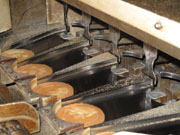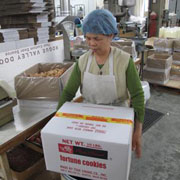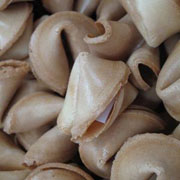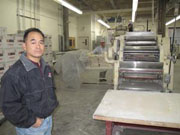VOA标准英语2011--Company's Fortunes Rest on Cookies
时间:2019-01-07 作者:英语课 分类:VOA标准英语2011年(十一月)
Company's Fortunes Rest on Cookies
The rush begins in the morning at the Tsue Chong factory in Seattle, Washington's International District. Every day, dozens of cars pull up to stock up on the golden brown cookies with a saying inside.
“Customers come in, they double park," says factory owner Tim Louie. "They come in, load up their trucks and take off; not a very long stop, maybe five minutes.”
The business was established in 1917 by Louie's great-grandfather, who emigrated from China.
The company makes most of its money from manufacturing noodles. But what most customers in the area know Tsue Chong for is fortune cookies. You can find them in almost every Chinese restaurant in the neighborhood.

The soft pancakes are ready to be stuffed with a fortune and folded, all within 10 seconds, to become a traditional fortune cookie.
At Jade 1 Garden restaurant, a few blocks down the street, Alan Sidell is enjoying dim sum for lunch. He's been coming to the International District for most of his life, and the fortune cookie factory is an integral part of his neighborhood memories.
“They had a screen door that was open and you could walk down the street and you could watch the fortune cookie machines twirling around, and you saw the attendants placing each fortune into the dough 2 before it was closed up.”
Fortune cookies are a staple 3 at U.S. Chinese restaurants. The wafers are folded around a small slip of paper. The fortunes are pithy 4, but cryptic 5, like: "Good things come in invisible packages" and "Accept the next proposition you hear."

A Tsue Chong factory worker prepares to ship out a box of fortune cookies.
No one knows where or when the cookies originated. Some say the idea came from the Chinese who put notes in mooncakes to warn of the Mongolian invasion in the late-13th century. A Japanese scholar cites the city of Kyoto, Japan as the birth place of the fortune cookie. Tim Louie has a hunch 6 they were created in San Francisco.
Whatever their origin, Tsue Chong began baking them in the 1950s. And today, fortune cookies make up a quarter of its business.
The top floor of the factory, where most of the production takes place, is filled mostly with a diversity of noodles, but one corner is devoted 7 to fortune cookies.
First comes the batter 8, blended in large mixers.
“It starts off with six ingredients. This is my grandma's original recipe," says Louie. "Wheat flour, sugar, vanilla 9, water, eggs and coconut 10 shortening. And the batter is really thin. It's almost like a pancake or crepe batter.”

Tsue Chong factory in Seattle, Washington, was established in 1917 and now produces almost 30 million fortune cookies a year.
Workers carry the batter in buckets to large, round machines.
“There's a tube that goes in there and it siphons it up and pumps it onto round griddles, a couple of tablespoons [about 30 milliliters] per griddle. And as the carousel 11 turns, a lid sets down and flattens 12 and spreads the batter out.”
The batter turns into a mini-pancake. The round cookie is still soft for about 10 seconds, enough time to finish the work. Decades ago, women bakery workers would put the fortunes into the warm cookies and fold them by hand. Today, machines do it.
“The fortunes are all stacked a top of that tray. And by a vacuum, it'll pluck one off the tray and stuff it into the cookie.”
Tsue Chong makes almost 30 million cookies a year.
Louie says the company has been fortunate, despite recent hard economic times.

According to factory owner Tim Louie, fortune cookies make up about one-quarter of his business.
“I won't say we were recession-proof, but we were able to survive it, where a lot of other business, 35-40 years old, did not survive. So I believe just manufacturing food because people have to eat, we were able to weather the recession.”
Even though restaurant orders were down, supermarkets bought more items from Tsue Chong because more people were eating at home more. But as the business goes forward, Tim Louie says he is not going to leave his company's future to luck.
He plans to make the production process more efficient and wants to improve his fortunes, by moving into new markets along the West Coast.
- The statue was carved out of jade.这座塑像是玉雕的。
- He presented us with a couple of jade lions.他送给我们一对玉狮子。
- She formed the dough into squares.她把生面团捏成四方块。
- The baker is kneading dough.那位面包师在揉面。
- Tea is the staple crop here.本地产品以茶叶为大宗。
- Potatoes are the staple of their diet.土豆是他们的主要食品。
- Many of them made a point of praising the film's pithy dialogue.他们中很多人特别赞扬了影片精炼的对白。
- His pithy comments knocked the bottom out of my argument.他精辟的评论驳倒了我的论点。
- She made a cryptic comment about how the film mirrored her life.她隐晦地表示说这部电影是她人生的写照。
- The new insurance policy is written without cryptic or mysterious terms.新的保险单在编写时没有隐秘条款或秘密条款。
- I have a hunch that he didn't really want to go.我有这么一种感觉,他并不真正想去。
- I had a hunch that Susan and I would work well together.我有预感和苏珊共事会很融洽。
- He devoted his life to the educational cause of the motherland.他为祖国的教育事业贡献了一生。
- We devoted a lengthy and full discussion to this topic.我们对这个题目进行了长时间的充分讨论。
- The batter skied to the center fielder.击球手打出一个高飞球到中外野手。
- Put a small quantity of sugar into the batter.在面糊里放少量的糖。
- He used to love milk flavoured with vanilla.他过去常爱喝带香草味的牛奶。
- I added a dollop of vanilla ice-cream to the pie.我在馅饼里加了一块香草冰激凌。
- The husk of this coconut is particularly strong.椰子的外壳很明显非常坚固。
- The falling coconut gave him a terrific bang on the head.那只掉下的椰子砰地击中他的脑袋。
- Riding on a carousel makes you feel dizzy.乘旋转木马使你头晕。
- We looked like a bunch of awkward kids riding a slow-moving carousel.我们看起来就像一群骑在旋转木马上的笨拙的孩子。